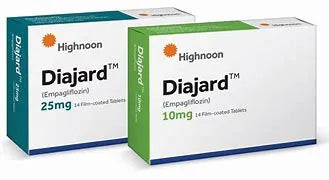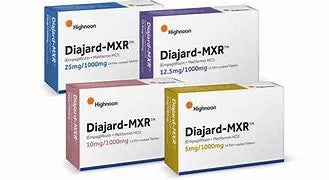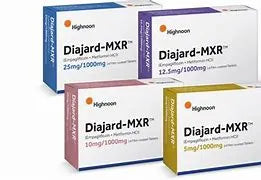Introduction
Diajard 10/25mg is a combination medicine prescribed in Pakistan for patients with type 2 diabetes. It helps control blood sugar levels when diet and exercise alone are not enough. Doctors often use it in patients who need more than one medicine to keep their sugar balanced.
Composition
Each tablet contains:
-
Dapagliflozin 10mg – an SGLT2 inhibitor that lowers blood sugar by helping the kidneys remove excess glucose through urine.
-
Metformin 25mg (extended release) – a medicine that reduces glucose production in the liver and improves the body’s response to insulin.
Medical Use
Doctors prescribe Diajard for:
-
Type 2 diabetes mellitus in adults
-
Patients not achieving good sugar control with single therapy
-
Reducing long-term risks linked to uncontrolled diabetes, such as heart or kidney problems (when used under supervision)
How to Take
Diajard is taken orally with water, usually once daily with food to reduce stomach upset. The exact dose depends on blood sugar levels and the doctor’s advice. It should always be taken regularly, and patients should not stop or adjust the dose on their own.
Precautions
-
Use only under medical supervision.
-
Not recommended for type 1 diabetes or diabetic ketoacidosis.
-
Inform your doctor if you have kidney or liver disease, heart problems, or frequent urinary infections.
-
Pregnant or breastfeeding women should consult their doctor before use.
-
Avoid excessive alcohol intake while on this medicine.
-
Store in a cool, dry place, away from direct sunlight and children.
Side Effects
Some patients may experience urinary tract infections, increased urination, nausea, stomach upset, or headache. Rarely, dehydration, low blood sugar (if taken with other diabetes medicines), or lactic acidosis (from metformin) may occur. Severe side effects are uncommon but require urgent medical attention.
Doctor’s Review – Dr. Kamran Ali, Consultant Endocrinologist
Diajard is used in type 2 diabetes management as a combination of dapagliflozin and metformin. Together, these help lower blood sugar levels effectively with less risk of hypoglycemia. Staying well hydrated, monitoring blood glucose regularly, and maintaining follow-ups are important, as dosage adjustments should be tailored to each individual’s needs.
Disclaimer
This review is for educational and product knowledge purposes only. It is not a prescription and should not replace professional medical advice. Always consult a qualified healthcare professional before starting or changing any diabetes treatment.









Reviews
There are no reviews yet.